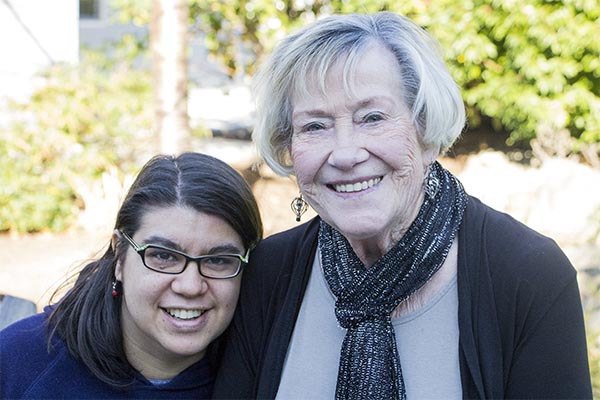For seniors facing the winter months, Marla Johns said there are three concerns: depression, isolation and an increase of falls.
“It’s a sad, lonely time,” said Johns, the Senior Services coordinator for the Orcas Senior Center.
One problem winter presents is shorter days. Even in daylight, overcast skies can make visibility a problem. For seniors with poor eyesight, the winter weather makes driving a difficult task. According to Johns, this causes seniors to venture out less and become more isolated.
The winter also presents a time when the roads are slippery and seniors are more likely to fall.
Many seniors are also dependent on wood to warm their homes in colder months. Chopping, stacking and collecting wood creates more opportunities for an older person to fall and injure themselves. Despite the hazards, Johns said it’s understandable that people continue to chop wood even as they age.
“No one wants to give up anything,” she said.
Johns comes from the school of thought that seniors are people who have “built the world we live in.”
But often these are the people who are forgotten in society. Johns sees many people who do not have family members come visit them during the holiday season, which causes depression.
“It’s hard to see people without anyone. It’s a lonely time of life,” she said. “Some of these people have even outlived their children.”
Johns urges people in the community to reach out to elderly neighbors or people they know that live alone.
“Falling down in a home is not about having a ‘Lifeline’ or not,” she said. “It’s about people not looking out for one another.”
There are several programs in place that aim to support seniors in tough times.
The Orcas Cares program is an emergency service for seniors that attempts to meet the unmet needs of seniors like cleaning a home or providing caregiver services.
Hearts and Hands, whose office is at the Orcas Senior Center, pairs up volunteers with adults.
Lahari is also an organization whose mission statement is “to support aged or infirm people up to and including provisions of hospice care.” It also runs the Orcas Safe Homes project which provides free in-home safety evaluations and advice on how to implement any recommendations that are made.
Another resource available when needed is access to private individuals who work as home health care aids. They can come into homes to assist with short or long term needs. This caregiver directory can be found at the Orcas Library and the Hearts and Hands office.
To see the binder at the Hearts and Hands office call Didier Gincig to make an appointment at 376-7723.
“We really should not even have to have a program like this,” said Johns about Hearts and Hands. “Helping seniors should be a lifestyle.”
A look at welfare checks
From November 2011 to February 2012, the San Juan County Sheriff’s Department recorded a total of 12 welfare checks. Eight of those included contact with the elderly including Lifeline activation after a power outage. Lifeline is a medical alert system and medical alarm service that helps seniors and people with disabilities receive instant assistance.
Other calls included a concerned caretaker reporting that an older person was not sleeping or eating and an elderly person in a disabled vehicle that could not call for help.
In the same months from 2012 – 2013, the sheriff’s office had 13 welfare checks and three involved the elderly. These calls included a person who was not seen at work for a week and a relative who was concerned about a family member they had not spoken to in three years.
In the winter of 2013 and 2014, there were 31 welfare calls, including 11 focused on the elderly.



